Liao, Shengyu, Stefan Th. Gries & Stefanie Wulff
2024.
Transfer five ways: applications of multiple distinctive collexeme analysis to the dative alternation in Mandarin Chinese.
Corpus Linguistics and Linguistic Theory 0:0

Hilpert, Martin
2022.
Review of Laporte, Samantha. 2021. Corpora, Constructions, New Englishes. A Constructional and Variationist Approach to Verb Patterning. Amsterdam: John Benjamins. ISBN: 978-9-027-20850-7. https://doi.org/10.1075/scl.100.
Research in Corpus Linguistics 10:2
► pp. 147 ff.

Kirk, John
2022.
Irish English as a World English.
Frontiers in Communication 7

Laliberté, Catherine
2022.
A Diachronic Study of Modals and Semi-modals in Indian English Newspapers.
Journal of English Linguistics 50:2
► pp. 142 ff.

García‐Castro, Laura
2020.
Finite and non‐finite complement clauses in postcolonial Englishes.
World Englishes 39:3
► pp. 411 ff.

Kranich, Svenja, Elisabeth Hampel & Hanna Bruns
2020.
Changes in the modal domain in different varieties of English as potential effects of democratization.
Language Sciences 79
► pp. 101271 ff.

Morin, Cameron, Guillaume Desagulier & Jack Grieve
Mukherjee, Joybrato & Tobias Bernaisch
2020.
Corpus Linguistics and Asian Englishes. In
The Handbook of Asian Englishes,
► pp. 741 ff.

Wei, Yipu, Dirk Speelman & Jacqueline Evers-Vermeul
2020.
Applying Collocation Analysis to Chinese Discourse: A Case Study of Causal Connectives.
Lingua sinica 6:1
► pp. 1 ff.

Yilmaz, Selahattin & Ute Römer
Bohmann, Axel
2019.
Variation in English Worldwide,

Hoffmann, Thomas
2019.
Debra Ziegeler, Converging grammars: Constructions in Singapore English (Language Contact and Bilingualism 11). Berlin: De Gruyter Mouton, 2015. Pp. xiv + 294. ISBN 9781614514091 (hardback)..
English Language and Linguistics 23:1
► pp. 215 ff.

Hoffmann, Thomas
2019.
English Comparative Correlatives,

Hoffmann, Thomas
2021.
The Cognitive Foundation of Post-colonial Englishes,

Xia, Lixin, Yun Xia & Qian Li
2019.
Colligational Patterns in China English: The Case of the Verbs of Communication. In
Chinese Computational Linguistics [
Lecture Notes in Computer Science, 11856],
► pp. 3 ff.

Brato, Thorsten
2018.
‘Outdooring’ the Historical Corpus of English in Ghana.
English Today 34:2
► pp. 25 ff.

Brato, Thorsten
2020.
Noun phrase complexity in Ghanaian English.
World Englishes 39:3
► pp. 377 ff.

Deshors, Sandra C. & Gaëtanelle Gilquin
Grafmiller, Jason & Benedikt Szmrecsanyi
2018.
Mapping out particle placement in Englishes around the world: A study in comparative sociolinguistic analysis.
Language Variation and Change 30:3
► pp. 385 ff.

Gries, Stefan Th., Tobias Bernaisch & Benedikt Heller
Hundt, Marianne
2019.
Corpus-Based Approaches to World Englishes. In
The Cambridge Handbook of World Englishes,
► pp. 506 ff.

Kopaczyk, Joanna & Jukka Tyrkkö
Mehl, Seth
2018.
Corpus onomasiology in world Englishes and the concrete verbsmakeandgive.
World Englishes 37:2
► pp. 185 ff.

Deshors, Sandra C.
2017.
Zooming in on Verbs in the Progressive: A Collostructional and Correspondence Analysis Approach.
Journal of English Linguistics 45:3
► pp. 260 ff.

Götz, Sandra
2017.
Non-Canonical Syntax in South Asian Varieties of English: A Corpus-Based Pilot Study on Fronting.
Zeitschrift für Anglistik und Amerikanistik 65:3
► pp. 265 ff.

Tang, Xuri
2017.
Lexeme-based collexeme analysis with DepCluster.
Corpus Linguistics and Linguistic Theory 13:1

Deshors, Sandra C. & Stefan Th. Gries
Edwards, Alison & Rutger-Jan Lange
Muhammad, Umar Aliyu, Ngee Thai Yap, Mei Yuit Chan & Bee Eng Wong
2016.
Identification of Nigerian English idioms: A methodological perspective.
Southern African Linguistics and Applied Language Studies 34:4
► pp. 279 ff.

PARVIAINEN, HANNA
2016.
The invariant tag isn't it in Asian Englishes.
World Englishes 35:1
► pp. 98 ff.

Velupillai, Viveka
2016.
Interview with Edgar W. Schneider.
Journal of English Linguistics 44:4
► pp. 346 ff.

Balasubramanian, Chandrika
Balasubramanian, Chandrika
2018.
Language in a Glocalized World. In
Language and Literature in a Glocal World,
► pp. 15 ff.

De Clerck, Bernard & Klaar Vanopstal
Edwards, Alison & Samantha Laporte
Gries, Stefan Th. & Sandra C. Deshors
2015.
EFL and/vs. ESL?.
International Journal of Learner Corpus Research 1:1
► pp. 130 ff.

Ronan, Patricia & Gerold Schneider
Bernaisch, Tobias, Stefan Th. Gries & Joybrato Mukherjee
Buschfeld, Sarah, Thomas Hoffmann, Magnus Huber & Alexander Kautzsch
Collins, Peter, Ariane Macalinga Borlongan & Xinyue Yao
2014.
Modality in Philippine English.
Journal of English Linguistics 42:1
► pp. 68 ff.

SCHNEIDER, EDGAR W.
2014.
New reflections on the evolutionary dynamics of world Englishes.
World Englishes 33:1
► pp. 9 ff.

Martinez‐Garcia, Maria Teresa & Stefanie Wulff
2012.
Not wrong, yet not quite right: Spanish ESL students' use of gerundial and infinitival complementation.
International Journal of Applied Linguistics 22:2
► pp. 225 ff.

Mukherjee, Joybrato & Marco Schilk
2012.
Exploring variation and change in New Englishes: Looking into the International Corpus of English (ICE) and beyond. In
The Oxford Handbook of the History of English,
► pp. 189 ff.

De Clerck, Bernard, Martine Delorge & Anne-Marie Simon-Vandenbergen
2011.
Semantic and Pragmatic Motivations for Constructional Preferences.
Journal of English Linguistics 39:4
► pp. 359 ff.

[no author supplied]
2013.
Reference Guide for Varieties of English. In
A Dictionary of Varieties of English,
► pp. 363 ff.

This list is based on CrossRef data as of 2 july 2024. Please note that it may not be complete. Sources presented here have been supplied by the respective publishers.
Any errors therein should be reported to them.
